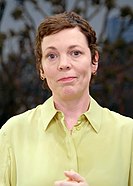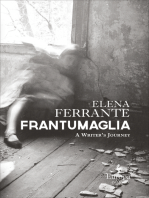프리미엄 나를 키운 여자들 ㅣ 18화
두 딸 버린 여 교수의 '욕망', 이런 영화를 기다렸다
[나를 키운 여자들] <로스트 도터> 속 레다
스타
홍현진(hong698)
22.08.29
공유제주로 가는 비행기 안, 40대 남성이 아기 울음소리가 시끄럽다며 난동을 부리다 경찰에 입건됐다. 보도에 따르면 이 남성은 술에 취한 상태였으며 갓난 아이와 부모에게 "누가 애 낳으래?""애XX가 교육 안 되면 다니지마, 자신 없으면 애 낳지마"라며 욕설과 폭언을 했다고 한다. 같은 날, 서울로 가는 KTX 열차 안에서는 30대 남성이 아이들이 떠든다는 이유로 아이와 엄마에게 폭언을 쏟아냈고, 이를 제지하는 승객에게 발차기를 했다.
뉴스를 보면서 돌도 채 되지 않은 아이와 둘이 KTX를 탔던 기억이 소환됐다. 서울에서 친정이 있는 부산까지 가는 길이었다. 편히 가려고 일부러 두 자리를 예약해 뒀지만 결론부터 말하자면 3시간 내내 좌석에 앉아 보지 못했다. 아이는 낯선 환경이 불편한지 칭얼대다 울다를 반복했다. 조용한 열차 칸에 아이 소리가 퍼지자 승객들의 따가운 시선이 느껴졌다.
아기띠를 하고 열차칸을 나와 복도로 갔다. 복도에도 승객들이 있었다. '쉬, 쉬' 소리를 내며 아이를 재우려 했지만 아이는 좀처럼 깊은 잠에 들지 못했다. 폭언이나 욕설을 하는 사람은 없었지만 이미 마음은 가시밭이었다. 대전역, 동대구역… 열차가 설 때마다 진심으로 아이를 열차 밖으로 던져버리고 싶었다. 도망치고 싶었다. 사라지고 싶었다. 그런 생각을 하는 나 자신에게 놀랐다. 나는 나쁜 엄마인가.
'나는 나쁜 엄마인가'라는 죄의식은 아이를 키우는 내내 반복됐다. 아이가 이앓이 때문에 밤새 수십 번 깨던 날, 할 일이 산더미처럼 쌓여 있는데 아이가 전염병에 걸렸던 날, 손가락 하나 까딱할 힘조차 없는데 아이가 계속 놀아달라고 하던 날, 공공장소에서 떼를 쓰고 장난을 치는 아이를 도저히 통제할 수 없던 날, 엄마로 사는 게 버거웠다. 계속 이 아이를 키울 수 있을지 자신이 없었다. 그때마다 생각했다. 나는 엄마가 되어서는 안 되는 사람이 아니었을까.
"자식들이란 끔찍한 부담이에요"
▲ 대학에서 이탈리아 비교문학을 가르치는 40대 교수 레다(올리비아 콜맨)는 여름 휴가를 맞아 그리스로 혼자 휴가를 떠난다.
<로스트 도터>는 육아의 미칠 것 같은 순간을 섬세하게 포착한 영화다. 대학에서 이탈리아 비교문학을 가르치는 40대 교수 레다(올리비아 콜맨)는 여름 휴가를 맞아 그리스로 혼자 휴가를 떠난다. 안락한 숙소, 평온한 바다. 완벽한 휴가지의 평화는 시끄럽고 무례한 대가족의 등장과 함께 무너진다.
가족끼리 뭉칠 수 있도록 선베드 자리를 옮겨달라는 대가족의 요청을 레다는 부드럽지만 단호하게 거절한다. 분위기가 험악해 지지만 레다는 아랑곳하지 않는다. 레다는 자신만의 선이 분명한 사람처럼 보인다.
장면이 바뀌고, 레다에게 자리를 옮겨달라고 했던 대가족의 여자가 레다에게 아까는 미안했다며 케이크를 내민다. 나이가 몇 살인지, 아이는 있는지 호구 조사가 이어진다. 배가 많이 불러 있는 여자는 곧 출산을 앞두고 있다. 레다는 스물다섯, 스물셋 두 딸이 있다고 말한다.
레다는 자신도 아까는 미안했다며 좀 불안했던 것 같다고 말한다. 출산을 앞둔 여자는 레다에게 "딸들과 떨어져 있어서 그럴지도요"라고 말한다. 그러자 레다는 또다시 부드럽지만 단호한 표정으로 의미심장하게 말한다.
네, 뭐. 곧 아시겠죠. 자식들이란 끔찍한 부담이에요.
만삭의 임신부에게 "자식들이란 끔찍한 부담"이라니. 이 여자 대체 뭐지. 매일 해변에서 수영하고 글을 쓰며 시간을 보내는 레다는 대가족 무리 사이에서 육아에 지쳐 있는 젊은 여자 니나(다코타 존슨)에게 자꾸만 눈이 간다.
니나의 어린 딸 엘레나는 한시도 엄마를 가만두지 않는다. 니나는 사랑스러운 눈길로 딸을 돌보지만 온몸에 묻어나는 피로를 숨길 수 없다. 선베드에 누워 있는 니나와 애착 인형에게 장난감 물주전자로 번갈아가며 물을 뿌리는 엘레나. 그 모습을 지켜보던 레다는 울컥 눈물을 삼킨다. 레다는 어린 두 딸을 키우던 자신의 젊은 시절을 떠올린다.
레다(제시 버클리)와 남편은 연구자 부부다. 둘 다 공부를 하지만 육아의 부담은 엄마인 레다에게 훨씬 많이 쏠려 있다. 푸석한 얼굴로 "엄마 잠깐만 눈 좀 감고 있을게"라며 바닥에 누워 있는 레다에게 두 딸은 끊임없이 말을 걸고 반응을 요구한다.
레다의 남편이 아이를 돌보기로 한 일요일, 거실에서 아이 울음소리가 들려온다. 남편은 대학에서 걸려온 전화를 받느라 바쁘고 레다는 헤드셋을 쓰고 공부에 몰두하고 있다. "나 일하잖아"라며 레다에게 아이 돌보기를 미루는 남편에게 레다는 지친 얼굴로 말한다. "난 질식하겠어."
끊기지 않게 과일 껍질을 깎는 것에 집착하는 레다를 꼭 닮은 첫째 딸은 엄마처럼 뱀을 만들고 싶어서 과일을 깎다 손을 다쳤다고 말한다. 엄마에게 혼나는 것이 두려운 아이는 울먹이면서 "뽀뽀해줘, 엄마. 너무 아파"라고 말한다. 상처를 확인한 레다는 아이를 달래지도 뽀뽀를 해주지도 않는다. 우는 아이에게 등을 돌리고 한숨을 쉬며 레다는 차갑게 말한다. "1분을 혼자 둘 수가 없어."
욕망을 가진 사람, 엄마
▲ 영화는 타오르는 욕구를 가진 한 사람의 인간으로서 레다(제시 버클리)를 보여준다. ⓒ ㈜영화특별시 SMC
아이에게 끝내 뽀뽀를 해주지 않는 레다의 마음이 뭔지 너무나 잘 알 것 같았다. 그래선 안 된다고 머리로는 생각하면서도 아이에게 못되게 굴고 싶을 때가 있다. "엄마 나 안아줘"라며 간절하게 손을 뻗는 아이를 뿌리치고 싶을 때가 있다. 왜 이 관계에서는 나만 모든 걸 포기해야 하는 건지 억울했다. 비뚤어지고 싶었다. 그러다가도 밤에 잠든 아이를 볼 때면 죄책감을 느꼈다.
커리어에 대한 욕망, 성적인 욕망, 엄마라는 이름에서 벗어나 자유롭고 싶은 욕망. 영화는 타오르는 욕구를 가진 한 사람의 인간으로서 레다를 보여준다. 특히 이탈리아어는 레다가 온전히 자신으로 존재할 수 있는 매개체다. 두 아이를 돌보는 와중에도 레다는 이탈리아어를 읊조리며 공부를 한다. 이탈리아어로 말을 하고 노래를 부를 때 레다는 비로소 살아 있는 것 같은 얼굴이 된다.
남편이 다른 지역에서 일을 하게 되면서 레다의 육아 부담은 더욱 커진다. 지도 교수의 초청으로 학회에 가게 된 레다는 시터에게 두 아이를 맡기며 꼼꼼하게 당부를 전한다. 그동안 레다가 얼마나 고군분투하며 아이들을 돌봤는지 알 수 있는 장면이다. 레다는 학회에서 자신의 학문적 능력을 알아봐 준 젊은 교수와 사랑에 빠진다. 레다와 젊은 교수는 이탈리아어로 밀어를 속삭인다.
엄마와 학자라는 정체성 사이에서 갈등을 겪는 레다처럼 나도 지난 몇 년간 육아와 일 사이에서 지독히 방황했다. 한 회사에 오랫동안 다녔던 나는 엄마가 된 후 세 번의 퇴사를 했다. 이직과 창업을 했고 글쓰기, 모임 등 사이드 프로젝트를 이어갔다.
남들은 애 엄마가 뭘 그리 일을 벌이냐 했지만 애 엄마이기에 더욱 절박했다. 어느 순간 '나'는 사라지고 엄마라는 이름만 남게 될까 두려웠다. 동시에 엄마로서의 역할도 소홀히 하고 싶지 않았다. 일과 육아 사이에서 줄타기를 하며 젊은 레다처럼, 지금의 니나처럼 나는 종종 질식할 것 같은 얼굴이 됐다. 도망치고 싶었다. 사라지고 싶었다.
지나가긴 하나요? 뭐라고 말해야 할지, 우울증인지 뭔지 모르겠는데… 지나가는 거죠?
니나는 40대 레다에게 묻는다. 레다는 답변을 피한다. 첫째가 7살, 둘째가 5살일 때 레다는 두 아이를 버리고 집을 나왔다. '애들이 없으니 어떻던가요?'라는 니나의 질문에 레다는 웃는지 우는지 알 수 없는 복잡한 얼굴로 말한다.
너무 좋았어요. 폭발하려는 걸 참다가 결국 터져버린 것처럼.
레다의 얼굴을 보며 니나는 말한다.
좋았던 것 같진 않네요.
영화의 제목 '로스트 도터'의 '로스트(lost)'는 '잃어버린', '되찾을 수 없는'이라는 의미를 갖고 있다. 영화 전개상 첫 번째로 잃어버리는 것은 인형이다. 니나의 딸 엘레나는 해변에서 애착 인형을 잃어버리는데 인형을 훔친 사람은 다름 아닌 레다다.
인형이 없어지자 엘레나는 엄마인 니나에게 더욱 집착한다. 레다는 그런 니나를 위로하면서도 인형을 돌려주지 않는다. 관객들은 궁금할 수밖에 없다. 레다는 대체 왜 저 인형을 훔친 걸까. 그리고 왜 인형을 안 돌려주는 걸까.
40대 레다는 훔친 인형을 깨끗하게 씻기고 예쁜 옷을 입혀서 꼭 끌어안고 잠을 잔다. 내게는 그 인형이 레다가 잃어버린 유년 시절의 딸들처럼 보였다. 이미 잃어버렸고 되찾을 수 없는 어린 딸들.
두 문장으로 이루어진 말
▲ 40대 레다는 젊은 니나(다코타 존슨)에게 동질감과 연민을 느낀다. ⓒ ㈜영화특별시 SMC
작별 인사조차 없이 집을 나왔던 레다는 3년 만에 다시 집으로 돌아간다.
엄마니까. 애들이 보고 싶어서. 난 아주 이기적이거든요.
아이들을 사랑하지만 집을 떠났고, 니나에게 연민을 느끼지만 니나 딸의 인형을 훔치고, 아이들이 없는 게 너무 좋았지만 아이들이 보고 싶어 다시 돌아갔고. 레다는 이상하고 모순적인 사람처럼 보인다. 자신을 "뒤틀린 엄마"라고 부르는 레다는 단 한 번도 자신의 욕망을 변명하지 않는다. 그때는 어쩔 수 없었다고 말하지도 않는다. 이 영화의 가장 큰 미덕이다.
영화를 보면서 <분노와 애정>이라는 책에 수록된 에세이 <나쁜 엄마 모임>이 떠올랐다. 제인 라자르가 쓴 <나쁜 엄마 모임>에서 작가의 친구 애나는 말한다. "애들을 너무 사랑하지만 애들이 진짜 미워." 그러자 작가가 말한다. "영화에서 엄마들이 애를 살리려고 트럭과 총알을 막아서는 거, 그거 다 진짜야. 애를 잃느니 차라리 죽는 게 나아. 아마 이게 사랑이 아닐까." 이어서 작가는 말한다. "하지만 애는 내 삶을 망가뜨려. 오로지 망가진 삶을 되찾기 위해 산다니까."
다음 구절은 내가 두고두고 찾아 읽는 구절이다.
나는 천천히 말을 마쳤다. 두 번째 문장이 없다면 첫 번째 문장은 기만적인 거짓말일 뿐이다…중략…우리는 언제나 말이 두 문장으로 이루어져 있다는 걸 배웠다. 두 번째 문장은 첫 번째 문장과 모순되는 것처럼 보이지만 그 안에는 일관성이 있었다. 우리가 양가성을 더욱 잘 받아들일 수 있게 되었기 때문이다. 양가성을 받아들이는 능력, 그것이 바로 모성애가 아닐까.아이를 사랑하면서도 아이가 미운 마음, 아이와 함께 있고 싶으면서도 아이와 멀어지고 싶은 마음, 혼자 있는 게 행복하면서도 아이 사진을 자꾸 들여다보는 마음. 모든 사람의 마음이 그렇듯 모성에도 두 가지 마음이 늘 함께 한다. 엄마의 마음은 늘 모순적인 것 같은 두 문장으로 이루어져 있다. 하지만 모성 이데올로기는 욕망을 가진 한 사람으로서의 엄마를 인정하지 않는다. 좋은 엄마는 아이를 위해 모든 것을 희생하고 헌신해야 한다고, 그렇지 않다면 나쁜 엄마라고 낙인을 찍는다.
<로스트 도터>는 겉으로 보기에 그저 귀엽고 예뻐 보이는 인형 안에 있는 구정물과 벌레를 굳이 끄집어 내서 관객들 눈앞에 보여 준다. 그러면서 이렇게 말하는 것 같다. 이기적인 뒤틀린 모성(motherhood)도 모성이라고. 정말로 나쁜 것은 엄마에게 오직 한 가지 마음만 갖기를 강요하는 사회라고. 이런 영화를 오랫동안 기다렸다.
얼마 전, 4살 아이를 둔 엄마와 함께 식당에서 밥을 먹었다. 4살 아이는 당연히 잠시도 가만있지 못했고, 아이 엄마는 KTX를 탔을 때 나처럼 초조하고 불안한 얼굴이 됐다. 4살 아이 엄마는 혼자 의젓하게 밥을 먹는 우리 집 7살 아이를 바라보며 물었다. 대체 언제 이렇게 키우냐고. "3년만 기다리면 돼요"라고 말하며 나의 3년 전을 떠올렸다.
돌이켜 보면 그때 나는 레다와 니나처럼 이 상황이 언젠가 지나가리라는 것을 도저히 믿을 수 없었다. 아이는 영영 자라지 않을 것 같았고 이 미칠 것 같은 상황이 무한 반복될 것 같았다. 아이가 자라기를 기다리는 사이 내가 사라져 버릴까 두려웠다. 벼랑 끝에 몰린 사람처럼 나를 몰아붙였다. 그래야 숨통이 트일 것 같았다. 아마 다시 그때로 돌아간다고 해도 나는 또 다시 지나치게 애를 쓰고 있을 것이다. 지금 알고 있는 것을 그때는 알 수 없으며 사람은 직접 겪은 것만을 믿는 존재이기 때문이다.
다만 나는 지금 내가 할 수 있는 일을 하려 한다. 공공장소에서 다른 아이 우는 소리가 들리면 나는 결코 고개를 돌려 쳐다보지 않는다. 안 그래도 숨이 넘어가고 있을 엄마에게 시선 하나를 더 보태고 싶지 않아서다. 내가 할 수 있는 최소한의 연대다. 비행기와 KTX에서 일어난 일에 대한 기사를 읽으며 다짐했다. 다음부터는 더 적극적으로 소리 내서 다른 엄마를 도와야겠다고.
The Lost Daughter
How The Lost Daughter confronts one of our most enduring cultural taboos
Maggie Gyllenhaal’s directorial debut, adapted from the short novel by Elena Ferrante, unravels the myth that motherhood comes naturally to women
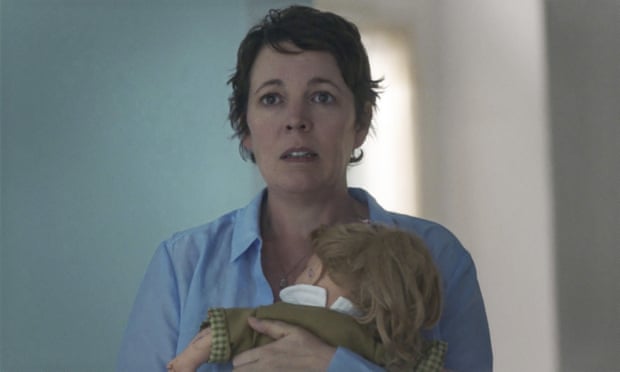 Olivia Colman in The Lost Daughter, a masterclass film in imbuing ostensibly low stakes with spellbinding tension. Photograph: Courtesy Of Netflix/AP
Olivia Colman in The Lost Daughter, a masterclass film in imbuing ostensibly low stakes with spellbinding tension. Photograph: Courtesy Of Netflix/AP
Adrian Horton
@adrian_hortonWed 5 Jan 2022 17.03 AEDT
It is clear from the opening minutes of The Lost Daughter, Maggie Gyllenhaal’s melancholic, bristly directorial debut on Netflix, that a dark secret stalks the sunny Mediterranean vacation of Leda Caruso, (a luminous Olivia Colman), a 48-year-old English professor of comparative literature. Her “working holiday” at a Greek island is immediately beset by increasingly ominous intrusions: a spectral foghorn, a bowl of rotting fruit, a shrill cicada, a boisterous Italian American family from Queens who disrupt her beachside reading. Memories pull at her focus; when the young daughter of Nina (Dakota Johnson), a beautiful, languid member of the Queens bunch who immediately catches Leda’s attention, goes briefly missing, Nina’s panic elides with a flashback to twentysomething Leda’s (Jessie Buckley) frantic search for her daughter Bianca at a beach.
The Lost Daughter review – Olivia Colman shines in Elena Ferrante missing-kid drama
Read more
It’s a familiar language of buried secrets, sinister subtext and unspooling memories – the building blocks of suspense – but the landmines in The Lost Daughter aren’t the usual culprits of dark revelation: unspeakable trauma or abuse, evil spirits, suppressed desires, the ravages of capitalism or greed. Instead, the molten core of The Lost Daughter is one of our culture’s most enduring and least touchable taboos: the selfish, uncaring, “unnatural” mother – one who doesn’t shift easily to care-taking, who does not relish her role, who not only begrudges but resents her children.
The Lost Daughter, adapted (and anglicized) from the short novel of the same name by Elena Ferrante, is a masterclass in imbuing ostensibly low stakes with spellbinding tension. The book is written entirely in Leda’s internal monologue, which Gyllenhaal, aided by Colman and Buckley’s fluid performances, conveys through taut dialogue and flashback sequences. The action is relatively mundane – Leda goes to the beach, eats dinner alone, and observes an exhausted Nina fielding the demands of her restless daughter Elena, who is lost for all of a few minutes. The most significant transgression is Leda’s impulsive and childish theft of Elena’s beloved doll. The film’s climactic reveal is not an act of abuse or searing trauma, as the prevalence of the trauma plot in film, TV and literature has taught us to expect, but an absence: for three years, Leda, desperate for reprieve and recognition, forfeited her role as mother, and left her daughters with her husband (Jack Farthing).
The stakes of The Lost Daughter feel so weighty, the viewing experience so unsettling and transgressive, because the myth Leda’s recollections deftly unravel – that motherhood will come to women naturally, that it will give something without taking something irreparable and valuable away – is so deeply woven into our culture as to be almost invisible. It is everywhere and nowhere, the idea of motherhood as an identity of tenderness, sacrifice, fulfillment and, above all, selflessness. It’s in commonly heard descriptions of motherhood as “my life completely changed”; “I became a different person”; “I found my purpose”; “I met myself”. (Which may be true for some people!) It shapes the image of mom-fluencers and so-called mommy blogs, informs the constant pressure for mothers to optimize every facet of their child’s life, and underpins the norms that, in the US, justify women as the de facto social safety net.
The Lost Daughter, as in several of Ferrante’s other works (fans will note themes further explored in her bestselling Neapolitan novels), dares to posit that for some, motherhood might not actualize the self but plunder it, especially if, like Leda, she becomes one while still barely an adult herself (doing the math, Leda was 23 when she had her first child, 25 for her second). Leda’s ambivalence toward motherhood – magnetic, vulgar, revelatory, repulsive – is a posture still rarely explored on screen. There are anti-mothering villains in films and television (Psycho, Carrie, the horror films Hereditary and The Lodge) but few examples of women who struggle with the expectations of the role in good faith, fewer still those who reject it.
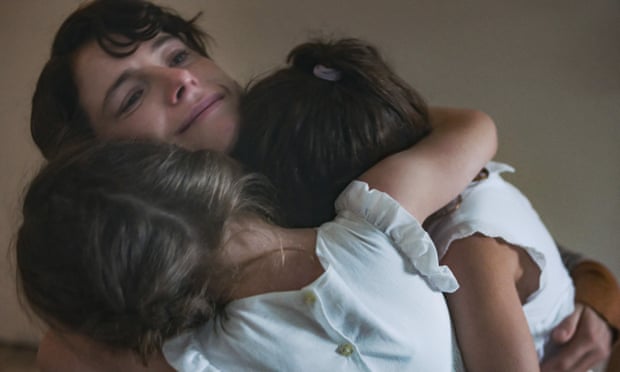 Jessie Buckley in The Lost Daughter. Photograph: Yannis Drakoulidis/AP
Jessie Buckley in The Lost Daughter. Photograph: Yannis Drakoulidis/APCrucially, The Lost Daughter is not a portrait of regret, for either having children or leaving them. Leda never says the word, nor does she appear to feel in isolation from other emotions such as guilt, anguish, pride, love. Gyllenhaal takes pains to portray Leda as anything but an uncaring person. She comforts Nina, meets her confessions with serrated vulnerability, offers up her apartment as a hideaway for the young mother’s nascent affair. She glows reminiscing about her 20s over dinner, comforts a frightened, lost Elena on the beach. In flashback sequences, Leda can be withholding, vindictive, unreasonable with her daughters; she is also doting, curious, radiant, expressive as she teaches her children to read, to play, or just holds them.
Watching the scenes of her failures and abandonment – rebuffing her daughters, lashing out at them, leaving them – is an uncomfortable experience. Self-absorption is often indistinguishable from self-preservation, and neither are pretty. I resent Leda for ignoring her children, and I can imagine the language through which they’ll later describe their abandonment, perhaps estrangement. (For what it’s worth, I write this as a 28-year-old woman both drawn to and terrified by the prospect of having kids.) But Gyllenhaal’s unwavering focus on Leda’s battered interiority, and Colman and Buckley’s equal expressiveness, refuse to allow you to condemn her.
Leda is a woman under siege – in the past, from the constant barrages of motherhood upon her body, sleep, time, academic career, her identity, sexiness, professional opportunities. She has no outlet for herself, no recourse for the pressure and little help from her clueless husband. In the present, from the memories of exhaustion, the hauntings of failure, the ghosts of condemnation. Motherhood, she delicately tells a pregnant member of the Queens family, is “a crushing responsibility”. The Lost Daughter sits with a woman who escaped its suffocation, however temporarily; the women who experience it disjointedly, and for whom there is no peace.
The Lost Daughter is now available on Netflix
The Lost Daughter
| The Lost Daughter | |
|---|---|
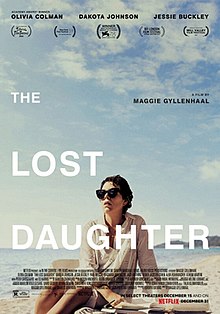 Promotional release poster | |
| Directed by | Maggie Gyllenhaal |
| Written by | Maggie Gyllenhaal |
| Based on | The Lost Daughter by Elena Ferrante |
| Produced by |
|
| Starring | |
| Cinematography | Helene Louvart |
| Edited by | Affonso Gonçalves[1] |
| Music by | Dickon Hinchliffe[2] |
Production companies |
|
| Distributed by | |
Release dates |
|
Running time | 121 minutes[4] |
| Countries |
|
| Language | English |
| Budget | $5 million[5] |
| Box office | $622,635[6] |
The Lost Daughter is a 2021 psychological drama film written and directed by Maggie Gyllenhaal (in her feature directorial debut), inspired by the 2006 novel of the same name by Elena Ferrante. The film stars Olivia Colman, Dakota Johnson, Jessie Buckley, Paul Mescal, Dagmara Domińczyk, Jack Farthing, Oliver Jackson-Cohen, with Peter Sarsgaard, and Ed Harris. Colman also serves as an executive producer.
The Lost Daughter had its world premiere at the 78th Venice International Film Festival on September 3, 2021, where Gyllenhaal won the Golden Osella Award for Best Screenplay.[7] It began a theatrical limited release in the United States on December 17, 2021, prior to streaming on Netflix on December 31. The film was acclaimed by critics, and at the 94th Academy Awards received three nominations: Best Actress (Colman), Best Supporting Actress (Buckley), and Best Adapted Screenplay.[8]
Plot[edit]
While on holiday in Greece, middle-aged college professor and noted translator, Leda Caruso, meets Nina, a young mother, after Nina's three-year-old daughter Elena goes momentarily missing on the beach. Leda finds Elena and returns her to Nina, who expresses her growing exhaustion and unhappiness. Elena is upset after she loses her favorite doll, which Leda has secretly taken. In flashbacks, it is revealed that young Leda also struggled with being a young mother to her two daughters, Bianca and Martha, often losing her patience and becoming withdrawn from her family.
One evening, Leda has dinner with Lyle, her holiday apartment's caretaker, who sees that she has the doll but doesn't comment on it, nor does he tell Nina. Leda later discovers Nina is having an affair with Will, who works at the beach bar, and Nina explains that her husband Toni is very controlling. The search for Elena's doll continues, with Nina even putting up flyers offering a reward for its return.
At a market, Leda buys Nina a hatpin to help hold her sunhat in place. When Nina asks Leda about her daughters, Leda becomes emotional; she reveals that she had abandoned them for three years after she became too overwhelmed, leaving them with her now ex-husband, during which time she had an affair with a fellow professor. She admits that being away from her daughters felt "amazing," and she only went back to them when she genuinely missed them. Nina learns that Leda knows about her and Will, and Will later asks Leda if they can borrow her apartment to have sex.
The next day when Nina arrives at Leda's to get the apartment keys, Leda admits to being a selfish and "unnatural" mother and warns Nina that her depression will never go. Leda also gives her Elena's doll, confessing that she took it and that she was "just playing." Nina reacts angrily and stabs Leda in the stomach with the hatpin before leaving. That night, Leda packs her bags and leaves the resort, but drives her car off the road due to the pain from her wound. She stumbles down the beach and collapses on the shoreline.
The next morning, Leda awakens on the beach and calls Bianca, who happens to be with Martha. They express their relief to hear from their mother, from whom they had not heard in several days. Leda says she is fine and then looks down to discover an orange in her hands; she peels the orange skin off "like a snake," the way she had done for her daughters when they were little.
Cast[edit]
- Olivia Colman as Leda Caruso
- Jessie Buckley as young Leda Caruso
- Dakota Johnson as Nina
- Ed Harris as Lyle
- Dagmara Domińczyk as Callisto "Callie"
- Paul Mescal as Will
- Robyn Elwell as Bianca
- Ellie James as older Bianca (voice)
- Ellie Blake as Martha
- Isabelle Della-Porta as older Martha (voice)
- Peter Sarsgaard as Professor Hardy
- Jack Farthing as Joe
- Oliver Jackson-Cohen as Toni
- Athena Martin as Elena
- Panos Koronis as Vassili
- Alba Rohrwacher as Female Hiker
- Nikos Poursanidis as Male Hiker
- Alexandros Mylonas as Professor Cole
- Konstantinos Samaa as Rough Boy
Production[edit]
Maggie Gyllenhaal acquired the film rights to the Elena Ferrante novel in October 2018, and wrote and directed the adaptation.[9] The lead character, Leda, says that she is named for the woman in the W. B. Yeats poem "Leda and the Swan", which Yeats based on the Leda story of Greek mythology.[10][11]
In February 2020, Olivia Colman, Jessie Buckley, Dakota Johnson and Peter Sarsgaard were cast in the film.[12] In August, Paul Mescal was added,[13] and in October 2020, Oliver Jackson-Cohen was cast as well,[14] with Ed Harris, Dagmara Domińczyk, Jack Farthing and Alba Rohrwacher joining in November.[15]
Principal photography began in Spetses, Greece, in September 2020.[16][17]
Release[edit]
The Lost Daughter had its world premiere at the 78th Venice International Film Festival on September 3, 2021.[18] In August 2021, Netflix acquired distribution rights to the film in the United States and several other countries,[3][19] adding more markets, including the United Kingdom, in October.[20] The film screened at film festivals in the Telluride,[21][22] Hamptons,[23] London,[24] Lyon Metropolis,[25] Mill Valley,[26] Montclair,[27] New York,[28] San Diego (closing night),[29] Zurich,[30] and Whistler Film Festival.[31] It was released in the United States on December 17, 2021, in a limited release prior to streaming on Netflix on December 31, 2021.[32][33]
Reception[edit]
At its opening night world premiere, the movie received a four-minute standing ovation from Venice Film Festival attendees in the Sala Grande.[34]
On Rotten Tomatoes, the film holds an approval rating of 95% based on 222 reviews, with an average rating of 7.9/10. The website's critics consensus reads: "A strikingly assured debut for writer-director Maggie Gyllenhaal, The Lost Daughter unites a brilliant cast in service of a daringly ambitious story."[35] On Metacritic, it has a weighted average score of 86 out of 100, based on reviews from 51 critics, indicating "universal acclaim".[36]
Mick LaSalle of the San Francisco Chronicle wrote: "Still, no matter how flat The Lost Daughter can sometimes seem, there's always something to hold our attention. The movie is never great, but it's never exactly dull. There's always a reason to stick around for the next scene."[37]
Jeannette Catsoulis of The New York Times wrote: “Equal parts troubling and affecting, Leda epitomizes a type of woman whose needs are rarely addressed in American mainstream movies. We can dislike her, but we are never permitted to revile her.”[38] Michael Phillips of the Chicago Tribune wrote Gyllenhaal “keeps a close eye on what brings out the best in a scene, and in a story worth telling, with morally imperfect, fully dimensional, persistently human characters.”[39]
Alissa Wilkinson of Vox wrote “The movie captures the spirit of the novel well. It’s suspenseful, but it’s not a thriller; there are elements of obsession and eroticism, but they never quite go where you expect. The end is deeply ambiguous, neither punishing nor condoning its characters’ behavior. It simply asks us to sit with them — to pay them the respect of attention, and learn something about ourselves in the process.”[40]
Armond White, who is known for his contrarian reviews, gave a negative assessment in the National Review, saying the film “is so perfectly rotten that it surely reflects some twisted, deep-seated attitude held by Maggie Gyllenhaal, the actress turned director-writer, again taking to her soapbox for a politically modish statement”.[41]
The Lost Daughter
Another penetrating Neapolitan story from New York Times–bestselling author of My Brilliant Friend and The Lying Life of Adults.
Leda, a middle-aged divorcée, is alone for the first time in years after her two adult daughters leave home to live with their father in Toronto. Enjoying an unexpected sense of liberty, she heads to the Ionian coast for a vacation. But she soon finds herself intrigued by Nina, a young mother on the beach, eventually striking up a conversation with her. After Nina confides a dark secret, one seemingly trivial occurrence leads to events that could destroy Nina’s family in this “arresting” novel by the author of the New York Times–bestselling Neapolitan Novels, which have sold millions of copies and been adapted into an HBO series (Publishers Weekly).
“Although much of the drama takes place in [Leda’s] head, Ferrante’s gift for psychological horror renders it immediate and visceral.” —The New Yorker
“Ferrante’s prose is stunningly candid, direct and unforgettable. From simple elements, she builds a powerful tale of hope and regret.” —Publishers Weekly
Psychological
Marriage & Divorce
Contemporary Women's
Page 1 of about 76 results (0.05 seconds)
Elena Ferrante
Elena Ferrante (pseudonym) | |
|---|---|
| Occupation | Novelist |
| Language | Italian |
| Nationality | Italian |
| Genre | Literary fiction |
| Notable works | Neapolitan Novels |
| Years active | 1992–present |
| Website | |
| elenaferrante | |
Elena Ferrante (Italian pronunciation: [ˌɛːlena ferˈrante]) is a pseudonymous Italian novelist. Ferrante's books, originally published in Italian, have been translated into many languages. Her four-book series of Neapolitan Novels are her most widely known works.
Time magazine called Ferrante one of the 100 most influential people in 2016.
Writing[edit]
Elena Ferrante is the name used by the author of many novels, including the four-volume work titled the Neapolitan Novels.[1][2] The Neapolitan Novels tell the life story of two perceptive and intelligent girls, born in Naples in 1944, who try to create lives for themselves within a violent and stultifying culture. The series consists of My Brilliant Friend (2012), The Story of a New Name (2013), Those Who Leave And Those Who Stay (2014), and The Story of the Lost Child (2015), which was nominated for the Strega Prize, the most prestigious Italian literary award.[3][4]
Ferrante holds that "books, once they are written, have no need of their authors."[5] She has repeatedly argued that anonymity is a precondition for her work[6] and that keeping her true name out of the spotlight is key to her writing process.[7] According to Ferrante,
The first appearance of her work in English was the publication of a short story, "Delia's Elevator". translated by Adria Frizzi in the anthology After the War (2004).[9] It narrates the movements of the title character on the day of her mother's burial, particularly her return to her safe retreat in the old elevator in the apartment building where she grew up.
The fourth book of Ferrante's Neapolitan quartet, The Story of the Lost Child, appeared on The New York Times' 10 Best Books of 2015.[10] Her first novel after finishing the quartet, The Lying Life of Adults, was translated into English by Ann Goldstein and played with the stereotypical teenage-girl-coming-of-age structure.[11]
Anonymity[edit]
Despite being recognized as a novelist on an international scale,[12] Ferrante has kept her identity secret since the 1992 publication of her first novel.[8] Speculation as to her true identity has been rife, and several theories, based on information Ferrante has given in interviews as well as analysis drawn from the content of her novels, have been put forth.
In 2003, Ferrante published La Frantumaglia, a volume of letters, essays, reflections and interviews, translated into English in 2016, which sheds some light on her background. In a 2013 article for The New Yorker, critic James Wood summarized what is generally accepted about Ferrante, based in part on letters collected in that volume:
In March 2016, Marco Santagata, an Italian novelist and philologist, a scholar of Petrarch and Dante, and a professor at the University of Pisa,[13] published a paper detailing his theory of Ferrante's identity. Santagata's paper drew on philological analysis of Ferrante's writing, close study of the details about the cityscape of Pisa described in the novel, and the fact that the author reveals an expert knowledge of modern Italian politics. Based on this information, he concluded that the author had lived in Pisa but left by 1966, and therefore identified the probable author as Neapolitan professor Marcella Marmo, who studied in Pisa from 1964 to 1966. Both Marmo and the publisher deny Santagata's identification.[1]
In October 2016, investigative reporter Claudio Gatti published an article jointly in Il Sole 24 Ore and Frankfurter Allgemeine Zeitung, that relied on financial records related to real estate transactions and royalties payments to draw the conclusion that Anita Raja, a Rome-based translator, is the real author behind the Ferrante pseudonym.[14] Gatti's article was criticized by many in the literary world as a violation of privacy,[6][15][16] though Gatti contends that "by announcing that she would lie on occasion, Ferrante has in a way relinquished her right to disappear behind her books and let them live and grow while their author remained unknown. Indeed, she and her publisher seemed to have fed public interest in her true identity."[6] British novelist Matt Haig tweeted, "Think the pursuit to discover the 'real' Elena Ferrante is a disgrace and also pointless. A writer's truest self is the books they write."[15] The writer Jeanette Winterson, in a Guardian article, denounced Gatti's investigations as malicious and sexist, saying "At the bottom of this so-called investigation into Ferrante's identity is an obsessional outrage at the success of a writer – female – who decided to write, publish and promote her books on her own terms."[17] She went on to say that the desire to uncover Ferrante's identity constitutes an act of sexism in itself, and that "Italy is still a Catholic country with strong patriarchial attitudes towards women."[17] Others responding to Gatti's article suggested that knowledge of Ferrante's biography is indeed relevant.[18][19]
In December 2016, the controversial Italian prankster[20] Tommaso Debenedetti published on the website of the Spanish daily El Mundo a purported interview with Raja confirming she was Elena Ferrante;[21] this was quickly denied by Ferrante's publisher, who called the interview a fake.[22]
In September 2017, a team of scholars, computer scientists, philologists and linguists at the University of Padua analyzed 150 novels written in Italian by 40 different authors, including seven books by Elena Ferrante, but none by Raja. Based on analysis using several authorship attribution models, they concluded that Anita Raja's husband, author and journalist Domenico Starnone, is the probable author of the Ferrante novels.[23] Raja has worked for E/O Publishing as copy editor and has been editing Starnone's books for years.
Ferrante has repeatedly dismissed suggestions that she is actually a man, telling Vanity Fair in 2015 that questions about her gender are rooted in a presumed "weakness" of female writers.[24]
Adaptations[edit]
Several of Ferrante's novels have been turned into films. Troubling Love (L'amore molesto) became the feature film Nasty Love directed by Mario Martone, while The Days of Abandonment (I giorni dell'abbandono) became a film of the same title directed by Roberto Faenza. The Lost Daughter, the 2021 directorial debut film of Maggie Gyllenhaal, is based on the novel of the same name. In her nonfiction book Fragments (La frantumaglia 2003), Ferrante speaks of her experiences as a writer.
In 2016, it was reported that a 32-part television series, The Neapolitan Novels, was in the works, co-produced by the Italian producer Wildside for Fandango Productions, with screenwriting led by the writer Francesco Piccolo.[25] In September 2018, the first two episodes of the renamed My Brilliant Friend, an Italian-language miniseries co-produced by American premium cable network HBO and Italian networks RAI and TIMvision,[26] were aired at the Venice Film Festival.[27] HBO started airing the complete eight episode miniseries, focusing on the first book in The Neapolitan Novels, in November 2018.[26] The second series of eight episodes was aired in 2020.
On 12 May 2020, Netflix announced a new drama series based on The Lying Life of Adults.[28][29]
Works[edit]
- L'amore molesto (1992; English translation: Troubling Love, 2006); filmed as Nasty Love (1995)
- I giorni dell'abbandono (2002; English translation: The Days of Abandonment, 2005)
- La frantumaglia (2003; English translation Frantumaglia, 2016)
- La figlia oscura (2006; English translation: The Lost Daughter, 2008)
- La spiaggia di notte (2007; English translation: The Beach at Night, 2016)
- L'amica geniale (2011; English translation: My Brilliant Friend, 2012). OCLC 778419313.
- Storia del nuovo cognome, L'amica geniale volume 2 (2012; English translation: The Story of a New Name, 2013). OCLC 829451619.
- Storia di chi fugge e di chi resta, L'amica geniale volume 3 (2013; English translation: Those Who Leave and Those Who Stay, 2014). OCLC 870919836.
- Storia della bambina perduta, L'amica geniale volume 4 (2014; English translation: The Story of the Lost Child, 2015). OCLC 910239891.
- L’invenzione occasionale (2019; English translation: Incidental Inventions, 2019). OCLC 1102387847.
- La vita bugiarda degli adulti (2019; English translation, The Lying Life of Adults, 2020). OCLC 1126993616
- I margini e il dettato (2021); English translation, In the Margins: On the Pleasures of Reading and Writing, 2022).
Awards and honours[edit]
- 2016 Time 100 Most Influential People[30]
- 2016 Man Booker International Prize, shortlisted for The Story of the Lost Child[31][32]
- 2016 Independent Publisher Book Award - Gold Medal (literary fiction), for The Story of the Lost Child[33]
- 2014 Best Translated Book Award, shortlisted for The Story of a New Name, translated from the Italian by Ann Goldstein[34]
References[edit]
- ^ a b Donadio, Rachel (13 March 2016). "Who Is Elena Ferrante? An Educated Guess Causes a Stir". The New York Times. Retrieved 14 March 2016.
- ^ Turner, Jenny (October 2014). "The Secret Sharer. Elena Ferrante's existential fiction". Harper's Magazine.
- ^ Wise, Louis (21 March 2015). "Elena Ferrante: mystery creator of her Neapolitan Novels". theaustralian.com.au. Archived from the original on 26 January 2017. Retrieved 22 January 2021.
- ^ "Elena Ferrante: Journalist defends unmasking 'anonymous' author". BBC.com. 3 October 2016. Retrieved 22 January 2021.
- ^ a b Wood, James (13 January 2013). "Women on the Verge: The Fiction of Elena Ferrante". The New Yorker. Retrieved 29 January 2013 – via Newyorker.com.
- ^ a b c Shepherd, Alex (2 October 2016). "The NYRB's argument for doxing Elena Ferrante is not very good". The New Republic. Retrieved 17 October 2018.
- ^ Domonoske, Camila (3 October 2016). "For Literary World, Unmasking Elena Ferrante's Not A Scoop. It's A Disgrace". The Two-Way. National Public Radio. Retrieved 22 January 2021 – via NPR.org.
- ^ a b Ferri, Sandro; Ferri, Sandra (Spring 2015). "Interview: Elena Ferrante, Art of Fiction No. 228". No. 212. The Paris Review. Retrieved 13 June 2015.
- ^ King, Martha (2004). After the War: A Collection of Short Fiction by Postwar Italian Women. New York: Italica Press. ISBN 978-0-934977-55-5.
- ^ "The 10 Best Books of 2015". The New York Times. 3 December 2015.
- ^ "New Stories, Old Pieces: On Elena Ferrante's "The Lying Life of Adults"". Cleveland Review of Books. Retrieved 23 November 2021.
- ^ Waldman, Adelle (15 January 2016). "The Ideal Marriage, According to Novels". The New Yorker. Retrieved 17 October 2018.
- ^ "Università di Pisa UniMap".
- ^ Gatti, Claudio (10 October 2016). "Elena Ferrante: An Answer?". New York Review of Books. Retrieved 17 October 2018.
- ^ a b Staff writers (3 October 2016). "Backlash for Reporter Who 'Outs' ID of Anonymous Writer Behind Elena Ferrante". Sky News. Yahoo! Lifestyle. Retrieved 17 October 2018.
- ^ Alexander, Lucy (5 October 2016). "Why is the exposure of Elena Ferrante causing such outrage?". BBC News Online. Retrieved 6 October 2016.
- ^ a b Winterson, Jeanette (7 October 2016). "The malice and sexism behind the 'unmasking' of Elena Ferrante". The Guardian. ISSN 0261-3077. Retrieved 14 April 2019.
- ^ Emre, Merve; Gutkin, Len (6 October 2016). "The Elenic Question". Los Angeles Review of Books. Retrieved 17 October 2018.
- ^ Bennett, Catherine (8 October 2016). "Why the prissy reaction to Ferrante being unmasked?". The Guardian. Retrieved 17 October 2018.
- ^ Dewey, Caitlin (30 June 2016). "Meet the internet's 'greatest liar' Tommaso Debenedetti, whose hoaxes have fooled millions". The Sydney Morning Herald. Retrieved 17 October 2018.
- ^ Debenedetti, Tommaso (10 December 2016). "Anita Raja a Tommaso Debenedetti: 'Yo soy Elena Ferrante'". El Mundo (in Spanish). Retrieved 30 September 2020.
- ^ Staff writers (5 October 2016). "Anita Raja conferma su Twitter: 'sono io Elena Ferrante. Ma ora lasciatemi vivere (e scrivere) in pace'. Ma dalla casa editrice smentiscono: 'tutto falso, è un fake'". LaNotizia. Retrieved 17 October 2018.
- ^ Savoy, Jacques (September 2017). "Elena Ferrante Unmasked". Université de Neuchâtel. Retrieved 17 October 2018.
- ^ Schappell, Elissa (27 August 2015). "The Mysterious, Anonymous Author Elena Ferrante on the Conclusion of Her Neapolitan Novels". Vanity Fair. Retrieved 17 October 2018.
- ^ Moylan, Brian (9 February 2016). "Elena Ferrante's Neapolitan novels set for TV adaptation". The Guardian. Retrieved 17 October 2018.
- ^ a b "My Brilliant Friend Debuts Sunday, Nov. 18 on HBO". HBO. 13 September 2018. Retrieved 17 October 2018.
- ^ D'Addario, Daniel (2 September 2018). "TV Review: 'My Brilliant Friend' on HBO". Variety. Retrieved 17 October 2018.
- ^ "The Lying Life of Adults | Announcement | Netflix". Netflix. Retrieved 12 May 2020.
- ^ "Netflix & Italy's Fandango to Develop Series Based on Elena Ferrante's 'The Lying Life of Adults'". 12 May 2020.
- ^ Groff, Lauren (21 April 2016). "The 100 Most Influential People: Elena Ferrante". Time. Retrieved 28 April 2016.
- ^ "'Anonymous' author on international Man Booker longlist". BBC News. 10 March 2016.
- ^ "Elena Ferrante could be the first-ever anonymous Booker winner". The Times of India.
- ^ "2016 Independent Publisher Book Awards Results". Independent Publisher. Retrieved 10 May 2016.
- ^ Chad W. Post (14 April 2014). "2014 Best Translated Book Awards: Fiction Finalists". Three Percent. Retrieved 18 April 2014.
Further reading[edit]
- Tiziana de Rogatis, Elena Ferrante. Parole chiave, e/o, Roma 2018
- Tiziana de Rogatis, Elena Ferrante's Key Words, Europa Editions, New York 2019
- Buonanno, Elda. La Frantumaglia: Elena Ferrante's "fragmented self", PhD thesis, City University of New York, 2011.
- Milkova, Stiliana. "Mothers, Daughters, Dolls: On Disgust in Elena Ferrante's La figlia oscura", Italian Culture 31:2 (September 2013).
- Mullenneaux, Lisa. "Naples' Little Women: The Fiction of Elena Ferrante". Penington Press, 2016.
- Pinto, Isabella. Elena Ferrante. Poetiche e politiche della soggettività, Mimesis, Milano 2020.
- Sharma, Bhasha Shukla (2018). "Doll, daughter, (m)other: switching roles in Elena Ferrante's The Lost Daughter" (PDF). Lapiz Lazuli: An International Literary Journal. 8 (1): 46–54.
External links[edit]
- Official website
- Elena Ferrante at IMDb
- Elena Ferrante's Troubling Love – book review in the Iowa Review
- Elena Ferrante: the global literary sensation nobody knows – The Guardian
Knausgaard or Ferrante - The New Yorker
===
Netflix is taking us to Italy with a new string of original Italian series – including an adaptation of Elena Ferrante’s ‘The Lying Life of Adults’
WORDS Elyssa Kostopoulos PHOTOGRAPHY Instagram PUBLISHED Mon, 20 Sep 2021 - 1:31 pm
To say we're desperate for a European holiday – particularly, a long-awaited re-visit to Italy – would be the understatement of the decade. Although we've already indulged in some deep-rooted manifestation for when we can finally get back in the sky (case in point, our guide to the best hotels in Puglia); the closest we have been able to get to any semblance of a holiday has been through our screens. Our beloved Stanley Tucci certainly filled a hole in our hearts with his series, Searching For Italy, and now, it seems like Netflix is also hoping to transport us with its latest offering original Italian series. Beginning, naturally, with an adaptation of beloved Italian author, Elena Ferrante's novel, The Lying Life of Adults.
It seems only fitting that Netflix begins its latest venture with a tale from the highly-regarded storyteller of Neapolitan Novels. For those unfamiliar with the author, Ferrante is possibly best known for My Brilliant Friend; her 2011 book which has already made it to the screen courtesy of HBO. And if you're a regular reader of RUSSH and find yourself wondering why Ferrante's name rings a bell; Maggie Gyllenhaal has also recently adapted another one of her books, The Lost Daughter, starring Olivia Colman, Dakota Johnson and Paul Mescal.
Needless to say, she – and her remarkable stories – are a hot commodity of late.
What is The Lying Life of Adults about?
The Lying Life of Adults will be broken-down into an eight-part drama; with filming for the upcoming series confirmed to begin in Naples this October. Giving us a taste of what to expect for those of us who have not read the book, Netflix's official synopsis describes the series as: "a powerful and singular portrayal of Giovanna's transition from childhood to adolescence in the 1990s."
Continuing; "A girl in search of her true reflection in a divided Naples: the Naples of the heights, which assumes a mask of refinement, and the Naples of the depths, a place of excess and vulgarity. Adrift, she vacillates between these two cities, falling into one then climbing back to the other."
Details on the cast and any potential release date still remain fairly tight-lipped. But while we wait for an update; we'll be cooking up an Italian storm thanks to these six easy recipes from Tucci's Searching For Italy. Care to join us?

